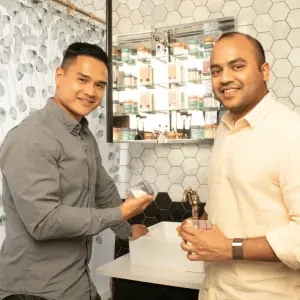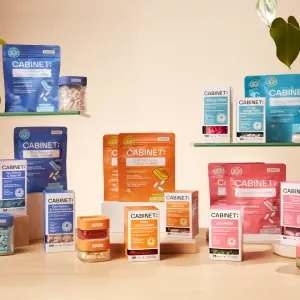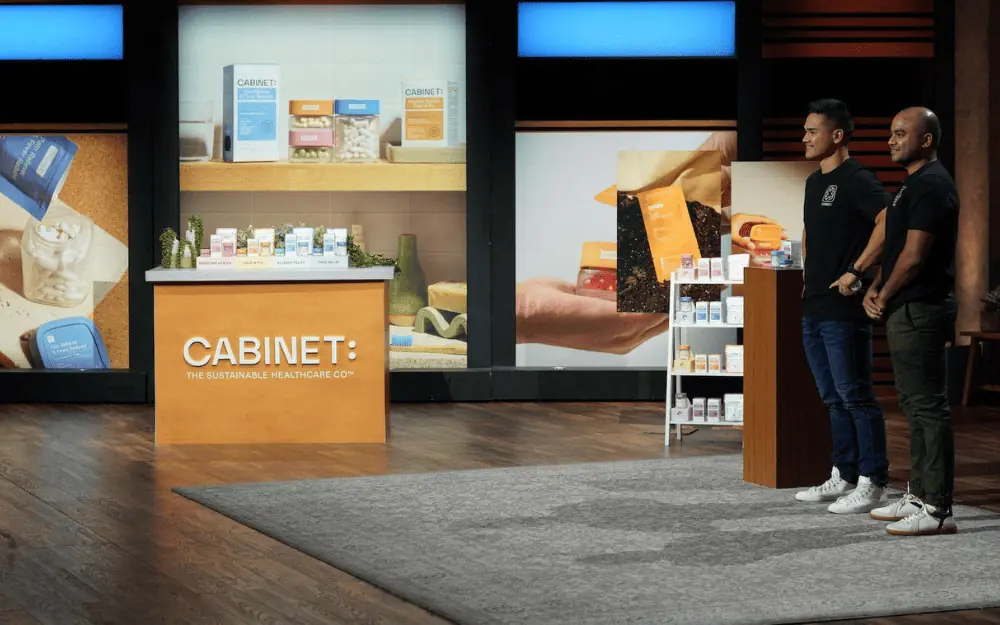Cabinet Health is a company with a new compostable and refillable packaging system for medications. They seek to eliminate many of the 190 billion single-use plastic medicine bottles which the industry produces every year. But will the Sharks be impressed enough to take a healthy bite out of this environmentally-friendly medicine packaging company? Read our Cabinet Health Shark Tank update to find out!
What is Cabinet Health?
Cabinet Health is a company which makes the world’s first sustainable and refillable medication packaging system. The company was founded in Washington, DC.
Cabinet Health designs and manufactures sustainable and compostable packaging for both over-the-counter and prescription medications. The company sells over-the-counter medications directly from their website, as well as many common prescription medicines through their partner pharmacy.
All medicines are delivered directly to the consumer’s door in medicine-safe pouches, which are designed to be composted at home.
Who created Cabinet Health?

Cabinet Health was co-founded by Russell Gong and Achal Patel in 2019. After graduating from the University of Richmond and attending the MIT Sloan School of Management’s Executive Program, Russell Gong has pursued two professional career tracks. First, since graduating, Russell has dedicated much of his career to sustainability. He acted as Director of Analytics and Innovation at the Global Good Fund, and he spent 8 years as a Program Director for Deloitte Consulting, working on issues surrounding sustainability. In a parallel career track, Russell is also an Infantry Officer in the US Army Connecticut National Guard, where he currently serves as a Captain.
Achal Patel holds a BA in Foreign Affairs, History and Pre-Health from the University of Virginia. Achal comes from a family of entrepreneurs in the medical field, as his grandfather built one of the first acetaminophen factories in a small town in India. After graduating from college, Achal worked at Deloitte Consulting, where he led the strategy and go-to-market efforts for RePurpose, a capability to enable clients to drive core business outcomes concurrently with social and/or environmental impact.
How did Cabinet Health get started?
In an interview with the MIT Sloan School of Management’s Alumni publication, Russell Gong said that after earning a bachelor’s degree in political science from the University of Richmond, he initially focused on community advocacy for immigrant organizations in the public sector, but some later work introduced him to one of the first iterations of a plastic bag tax law. “That was really the beginning of my interest in sustainability,” he said.
Gong said that he left the public sector for private industry when he joined Deloitte, where he ran a program that helped scale social enterprises and mission-oriented companies. The new role took him around the world to find and support such organizations, including a group procuring prosthetic arms and legs for Syrian children who lost their limbs in the country’s vicious civil war.
Gong said that his experience in Syria made him decide to dedicate himself to combating natural and manmade disasters, and to enlist in the Army National Guard. “My ultimate goal,” he explains, “was to figure out how best to use myself to combat issues like what I saw in the Syrian refugee camps.”
While traveling the world, and dealing with challenging problems in his work with Deloitte, he met Achal Patel, who also worked for the consulting firm. Gong related to the MIT publication that he and Patel became friends during a bumpy bus ride across the Balkan Peninsula while working together at Deloitte.
They both had big dreams about taking what they had learned by dealing with difficult situations abroad and applying them back home. Patel wanted to focus on healthcare, while Gong sought to work in sustainability, and these early conversations ultimately laid the foundation for Cabinet Health.
After a few more years at Deloitte, the pair left to co-found Cabinet Health, a certified B Corp dedicated to improving the environmental impact and quality of healthcare by eliminating single-use plastic in medicine.
What happened to Cabinet Health before Shark Tank?
Unlike many startups in the healthcare sector, Cabinet Health had a very solid supply line foundation, as co-founder Achal Patel’s family had been operating a medicine production factory in India for two generations. However, even with access to over-the-counter medications and supplements, the Cabinet Health team still had to spend a great deal of time and money working through prototyping and FDA approval for their compostable packaging, as new packaging for each type of medicine must undergo separate FDA approval.
How did Cabinet Health develop before Shark Tank?
Prior to appearing on Shark Tank, the company had 7 patents approved for their new compostable packaging for medicines, and they had filed for a number of additional patents. After getting FDA approval for their packaging, Cabinet Health began selling over-the-counter medication and supplements on their website, and during their Shark Tank episode, the Cabinet Health team told the Sharks that they currently had 700k customers.
When the Cabinet Health co-founders Russ and Achal appeared in the Tank, they also told the Sharks that the company would have $14 million in sales for 2023, and they projected sales of $25 million for 2024. However, the company was still not profitable, as they were still investing heavily in R&D in order to bring more new medical packaging to market and then have it approved by the FDA.
The Cabinet Health team had raised $13 million from investors prior to entering the Tank, and it appears that they had no major problems raising capital, as they did not approach Shark Tank to pitch to the Sharks; rather, a Shark Tank producer reached out to Cabinet Health and asked them if they would like to submit an application to be on the show.
What do customers think of Cabinet Health?

On both the company website and on Amazon, Cabinet Health offers a wide variety of over-the-counter medicines, all packaged in their patented compostable packaging. They offer medicines for cough relief, gas relief, allergy relief, pain relief, as well as cold and flu. On Amazon, the company’s Non-Drowsy Cough-Relief Softgels appeared to have the most reviews, so we took a dive into what customers thought of this product.
Amazon customers rated Cabinet Health’s Non-Drowsy Cough-Relief Softgels at 4.4 out of 5 stars, with 70% of customers giving the medicine a 5-star rating, and 12% rating the product at 4 stars, so the reviews were generally very positive.
What are customers saying about Cabinet Health?
With 82% of Amazon reviewers giving this Cabinet Health product 4 or 5 stars, most of the reviews for the Non-Drowsy Cough-Relief Softgels were positive.
One verified purchaser wrote, “I think I saw this on Shark Tank a while back and hoped I would be able to try it for myself. You came through! Medicine worked well, easy open top for those of us with arthritis and great packaging (I’m a graphic designer and appreciate “pretty” things for everyday items). I also went to your website to see what other products were available, and I would say – Good start! Keep it coming!”
Another satisfied cough medicine purchaser stated simply, “Great value and super easy to swallow. I also really like the refillable container.”
Interestingly, while the Cabinet Health co-founders spoke at great length about their packaging system during their Shark Tank episode, it is one aspect of this system, the refillable glass jars, which prompted most of the negative comments on Amazon.
One unhappy Amazon customer wrote, “The cough relief medication works great and is easy to swallow. The packaging looks great but is horrible. The storage jar is impossible to open. It is not only child-proof but adult-proof as well. If you have any age-related issues with your manual dexterity or hand strength do not order this product. I had planned to order other products from this company to better organize my medicine cabinet. Not happening now.”
Another frustrated Amazon purchaser wrote, “This is not worth it. I struggled so hard for so long that I finally cut my hand. I don’t know how good the Cabinet gels were because of this cap, and so I finally tossed them and now am back to using the easy to use Robitussum cough gels. Why wasn’t I sent a nice little packet of the Cabinet gels? Forget that glass jar. I would say do not buy because of it.”
Again, because of the Cabinet Health team’s focus on their packaging, it was really interesting to discover that almost all of the negative Amazon reviews revolved around problems with opening the refillable glass containers.
When did Cabinet Health appear on Shark Tank?
Cabinet Health appeared in Season 14, Episode 11 which aired on January 13th, 2023. The Cabinet Health team pitched to regular Sharks Mark Cuban, Lori Greiner, Barnara Corcoran, Kevin O’Leary, and Guest Shark Tony Xu, CEO and founder of DoorDash.
Cabinet Health appeared in Episode 11 of Season 14 alongside Wildwonder, a healthy sparkling drinks company, which found success in the Tank.
What happened to Cabinet Health on Shark Tank?
Cabinet Health co-founders Russell Gong and Achal Patel entered the Tank and asked the Sharks for a $500k investment in return for 2.5% of their company.
Russell Gong and Achal Patel walked onto the Shark Tank set and got right down to serious business, the medical industry, telling the Sharks that this particular business creates real environmental harm. Russell first told the Sharks the medical industry produces 190 billion single-use plastic medicine bottles every year, which is enough bottles to line them up from LA to Australia 325 times! Achal then let the Sharks know that only 3-7% of these plastic medicine bottles ever get recycled.
Next, Russell held up a fairly large container filled with tiny bits of plastic. He told the Sharks, “In my hand is the amount of microplastics that you unknowingly ingest every single year.” He said that this was like consuming a credit card every single week.
Russell next explained to the Sharks that Cabinet Health had created the world’s first compostable, refillable packaging system for medications, and he also informed the Sharks that their company currently manufactures and sells high-quality, over-the-counter medicines and supplements in their environmentally friendly packaging.
At this point in the pitch, the Sharks were invited to look at the samples in front of them. And Kevin O’Leary was interested in the glass bottle packaging and the refill pouches; he learned from Achal that customers purchase a starter set with the refillable, reusable glass jar, and the refills were then sent in the compostable pouches. O’Leary acknowledged that he liked the fact that the company was involved in selling a commodity.
Mr. Wonderful also learned that the company had over 700k customers, and the customers liked the product both because it was sustainable and that they saved considerably on refills when compared to name brand over-the-counter medications.
Lori Greiner then asked the Cabinet Health team about their backgrounds, and she discovered that Achal was a 3rd generation medical entrepreneur, as his grandfather had opened the first acetaminophen factory in India, and that Russell was a specialist in sustainable products.
Kevin O’Leary spoke up again, and as usual, he was looking for justification for the team’s $20 million company valuation for a Shark investor. Achal answered that they were on track to generate $14 million in revenues for the current year. O’Leary also learned that the company was still not profitable, as they were investing a great deal of money in R&D, but they anticipated to break even soon, and that the company would produce $25 million next year.
The Sharks all seemed to have difficulty understanding why the company was not yet profitable with $14 million in sales, and Mark Cuban declared, “Ok. I gotta call a little bit of BS here. You’ve got your sustainable packaging; you’re using OEM medication, but you’re not inventing any medications that are going through FDA approval.”
It appeared that even a Shark can learn something valuable, as Mark learned that every new package for an existing medicine must be approved by the FDA. Finally, Mark also discovered that the company had previously raised $13 million at an $81 million valuation, so Achal and Russell believed that the Sharks would be getting a big discount at the Shark Tank ask for a valuation of $20 million.
Several Sharks now appeared ready to swim or take bait, so read on to see which Sharks had been convinced to take a bite.
Did Cabinet Health get a deal on Shark Tank?
Cabinet Health successfully got a deal on Shark Tank. Kevin O’Leary and Guest Shark Tony Xu partnered and agreed to invest $500k for 7% equity in the company, and they each will also receive a royalty of 2% of top line revenue until they recoup $500k, doubling their initial investment.
When the negotiating began, Mark Cuban spoke first, and he told the team that while he appreciated what they were doing for sustainability, he also said that a lot of what they were doing did not add up for him. Kevin O’Leary quickly followed Cuban, but rather than backing out, he stated, “I believe in the power of sustainability being a motivator, but I can’t do this deal at your valuation.” O’Leary then tendered an offer of $500k for 12.5% of the company.
DoorDash founder, Guest Shark Tony Xu, jumped in next with an offer of $500k for 10%. Xu told Russell and Achal that he could really help them with the operational excellence needed to scale up. Achal then asked whether Mr. Wonderful and Tony Xu would consider partnering on a deal, or if Lori Greiner wanted to join a deal.
Lori Greiner told the Cabinet Health duo that while she loved what they were doing, she really hated their valuation, so she was quickly out. Finally, Achal then went back to O’Leary and Xu to see if they would consider a royalty structure to get their investment back, but with less equity. He offered a deal in which O’Leary and Xu would receive 7% equity and then earn a royalty until they recouped their investment.
O’Leary then countered that he and Tony would do the deal at 7% if they could recoup double their investment with the royalty. Russell and Achal accepted this deal, and as the Cabinet Health guys were leaving the Tank, O’Leary said, “Everytime I get a royalty, I feel warm and fuzzy,” to which Tony Xu replied to Kevin, “Sometimes, you’re actually wonderful!”
Cabinet Health Shark Tank update, what happened after Shark Tank?
While it is not yet known whether or not the deal between Cabinet Health and the Shark team of Kevin O’Leary and Tony Xu has closed, it is obvious that the company has grown significantly since their episode was taped.
At the time of taping their Shark Tank episode, Cabinet Health was selling over-the-counter medications and supplements in their patented eco-friendly packaging online; however, on the Cabinet Health website, the company states that is now able to fill prescriptions for over 150 different medications in their refillable and compostable packaging system.
Cabinet Health has also recently made its way into the aisles of retail drug stores in the US. The company now has its over-the-counter products on the shelves of more than 700 retail drug stores. Co-founder Russell Gong told Business Wire, “Cabinet’s expansion into retail is a leap forward for both the company and the healthcare industry as a whole.”
Aside from the national drugstore retail chain exposure with CVS, Cabinet Health also recently announced that their products are now available in select Target stores nationwide. With all of this immediate growth of the company just after the airing of its Shark Tank episode, it will be very interesting to find out if the deal with the Shark team will close. Perhaps, the company may decide that they no longer need the Sharks, or we may discover that the Sharks have already played a role in the recent rapid growth of Cabinet Health.

